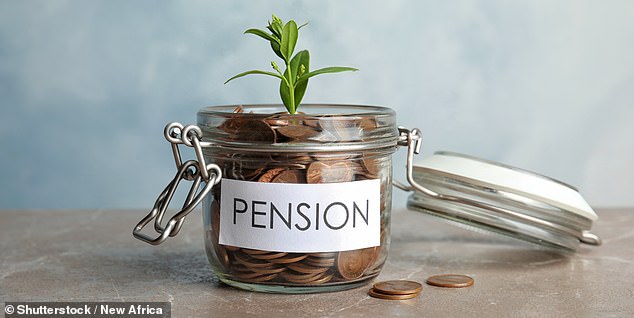People who die young will have inheritance tax levied on pension savings they never had a chance to spend under changes pending in April 2027.
Taxing pensions of anyone who dies before 55 – the minimum age to access private pots – the same as older people’s has been decried as ‘unbelievably unfair’ and ‘abhorrent’ by some money experts.
There is no age cut-off under new rules, announced in last Autumn’s Budget, which will make unused pensions liable for inheritance tax like other assets such as property, savings and investments.
Inheritance tax is levied at 40 per cent on estates above a certain size – scroll down to find out if you will leave your beneficiaries enough to be affected.
The vast majority of people currently have to wait until they are 55 to access private pensions, or be slapped with punitive tax charges – and put themselves at dire risk of being scammed.
Savers will be barred for even longer starting from 6 April 2028, when the minimum private pension age will rise from 55 to 57.

Pending rules: People who die aged under 55 will have inheritance tax levied on pension savings they never accessed
There are only limited exceptions to this age restriction, for people in certain uniformed public service jobs or those diagnosed with a terminal illness.
Unless you are in these groups, any early access ‘pension liberation’ schemes you might come across are virtually certain to be scams – savers are strongly warned to steer clear.
The Government’s plan to make money remaining in pension pots liable for inheritance tax has prompted widespread criticism that some families could be taxed twice.
If a saver is aged over 75 when they die, their beneficiaries are going to have to pay their normal income tax rate of 20 per cent, 40 per cent or 45 per cent on pension withdrawals too.
For a 40 per cent taxpayer this represents a 64 per cent tax rate – and as withdrawals from the unused pension pot will be added to other income, some taking larger sums may find themselves tipped into this higher tax band.
The Government disregarded experts’ warnings and recently confirmed plans to go ahead with this ‘double tax’ hit.
But it has exempted all ‘death in service’ benefits from the inheritance tax changes following an outcry – including from unions representing workers such as firefighters.
Regarding the impact of the changes on estates of people who die before age 55, it means levying inheritance tax on pensions a deceased person never had an opportunity to access.
However, creating a new ‘cliff edge’ IHT threshold at minimum pension age could be unfair and arbitrary for families of people who die on or shortly after their 55th birthday, and make the rules more complicated.
A Treasury spokesperson says: ‘We continue to incentivise pensions savings for their intended purpose – of funding retirement instead of them being openly used as a vehicle to transfer wealth – and more than 90 per cent of estates each year will continue to pay no inheritance tax after these and other changes.’
‘The message this gives to the public is – don’t save into your pension’
Ian Cook, chartered financial planner at Quilter Cheviot, says: ‘Charging IHT, on an asset you have to accrue and are automatically enrolled into, before retirement age is abhorrent.
‘It’s particularly brutal when someone will have built up with 20 per cent tax relief on the pension contributions if they’re a basic rate taxpayer, but then pay 40 per cent when they die.
‘It’s a disincentive for people to save for the long term. The message it gives to the wider public is: don’t save into your pension, which is wrong.’
Caitlin Southall, a director at financial services firm WBR Groupm says: ‘Including “unused” pension funds in scope for IHT is unbelievably unfair.
‘If people cannot “use” these funds under current rules, why should they be subject to IHT? The Government is creating significant barriers for people to save responsibly for their retirement.
‘By all means encourage people to use pensions for later life saving, and not as a wealth transfer tool, but this is not the way to do it.’
Michael Stimpson, partner at Saltus, says many wealthy people plan to transfer assets to their children more quickly while they are alive as a result of the inheritance tax changes, and recent HMRC data on pension withdrawals suggests this is already happening.
‘The news that inheritance tax will be levied on the pension pots of those who pass away before reaching the minimum pension age, set to rise to 57 in 2028, has thrown another spanner in the works,’ he adds.
‘At a time when savers are already withdrawing significant sums of money from pension funds, this trend could accelerate.
‘It is no secret that the Chancellor sees pension funds as key vehicles for economic growth, and if the Pension Schemes Bill allows regulators to compel workplace pension schemes to invest more in British assets, continued withdrawals from savers will only limit their buying power.’

Avoiding inheritance tax legally: Many savers with larger pensions are keen to avoid the new levy – find out how below
How will pension and IHT changes work in practice?
‘If these proposals go ahead, the process for applying inheritance tax to pensions will be far from straightforward,’ says Jon Greer, head of retirement policy at Quilter.
‘At present, pension death benefits are normally paid without inheritance tax, but under the changes the value could be pulled into the estate.
‘That would leave executors and beneficiaries facing the question of how to settle the bill. In practice, there are only three ways to pay it: from the free estate, directly from the pension, or by the beneficiary out of their own pocket.’
Greer says the main tax threshold to think about is age 75, when income tax starts to apply, but there is also a lesser-known pre-55 distinction.
Before age 55, most people can’t access their pension, as explained above. So, Greer suggests a payment could potentially be classed as a death-in-service benefit, and avoid being caught by IHT.
But he adds: ‘If, however, someone under 55 was still caught by the regime, the optics would be terrible. Taxing grieving families who’ve lost someone in their working years is hardly a vote winner, and in revenue terms it would raise very little for the Treasury.’

Age limit: Vast majority of people currently have to wait until they are 55 to access private pensions – and the minimum age will rise to 57 in April 2028
How do you avoid the looming inheritance tax raid on pensions?
Many savers with larger pensions are keen to avoid the new inheritance tax levy, and there are ways to do this legitimately – though some are more sensible than others, depending on your wealth and personal circumstances.
First off, consider consider if you really are likely to have a big enough estate to pay inheritance tax, especially after you have spent down your pensions and other assets during retirement.
Check the rules in the box further below, before you start worrying about your beneficiaries paying inheritance tax after you are gone. If you have cause for concern, consider the following options.
1. If you can afford it, you can spend or gift as much of your pensions as possible, while avoiding a big income tax bill.
Recent research showed many savers with larger pensions intend to spend them by splashing out on more holidays.
Bear in mind it is better to avoid crystallising losses by making bigger pension withdrawals in market downturns.
2. Consider gifting out of surplus income, which remains inheritance tax-free providing you can afford it.
We explain how to do this and prove to the taxman you are doing it from actual surplus income.
A This is Money reader explains how he is doing this to pass his wealth to his two daughters.
3. Look into buying life insurance and putting it in trust.
This can mean your loved ones get a payout straight after your death and free of inheritance tax – but you have to set it up correctly.
Here’s how to put life insurance into trust, but be aware that premiums can be high especially as you get older, and if you cancel a policy you immediately lose all the benefits of taking it out in the first place.
4. Leave more or all of your estate to your spouse, who can still benefit from estates free of inheritance tax, instead of your children to delay and minimise the eventual bill.
Wealth manager Evelyn Partners has suggested there could be a marriage boom or rise in civil partnerships among older couples as a result of the inheritance tax changes – read its six options to cut inheritance tax on pensions.
5. Buying an annuity is another option which Evelyn Partners explores.
Meanwhile, beware – although some people have raised the idea of siphoning pension funds into stocks and shares Isas, these are also liable for inheritance tax, and there are other pitfalls.
A financial planner from Quilter Cheviot explains how switching pensions into Isas can backfire.
How much is inheritance tax and who pays?
Inheritance tax is levied at 40 per cent on estates above a certain size.
You need to be worth £325,000 if you are single, or £650,000 jointly if you are married or in a civil partnership, for your loved ones to have to stump up inheritance tax. This threshold is called the nil rate band.
A further allowance, the residence nil rate band, increases the threshold by £175,000 each – so £350,000 for a married couple – for those who leave their home to direct descendants.
This creates a potential maximum joint inheritance tax-free total of £1million.
This own home allowance starts being removed once an estate reaches £2million, at a rate of £1 for every £2 above the threshold. It vanishes completely by £2.3million.
Chancellor Rachel Reeves said in the last Budget these thresholds will be frozen until 2030.
> Essential guide: How inheritance tax works
> Ten ways to avoid inheritance tax legally
> How to work out and pay inheritance tax
> Help with inheritance tax: Find out more with our partner Flying Colours
<!- – ad: https://mads.dailymail.co.uk/v8/us/money/moneypensions/article/other/mpu_factbox.html?id=mpu_factbox_1 – ->
SIPPS: INVEST TO BUILD YOUR PENSION

AJ Bell

AJ Bell
0.25% account fee. Full range of investments

Hargreaves Lansdown

Hargreaves Lansdown
Free fund dealing, 40% off account fees

Interactive Investor

Interactive Investor
From £5.99 per month, £100 of free trades

InvestEngine

InvestEngine
Fee-free ETF investing, £100 welcome bonus
Prosper
Prosper
No account fee and 30 ETF fees refunded
Affiliate links: If you take out a product This is Money may earn a commission. These deals are chosen by our editorial team, as we think they are worth highlighting. This does not affect our editorial independence.
